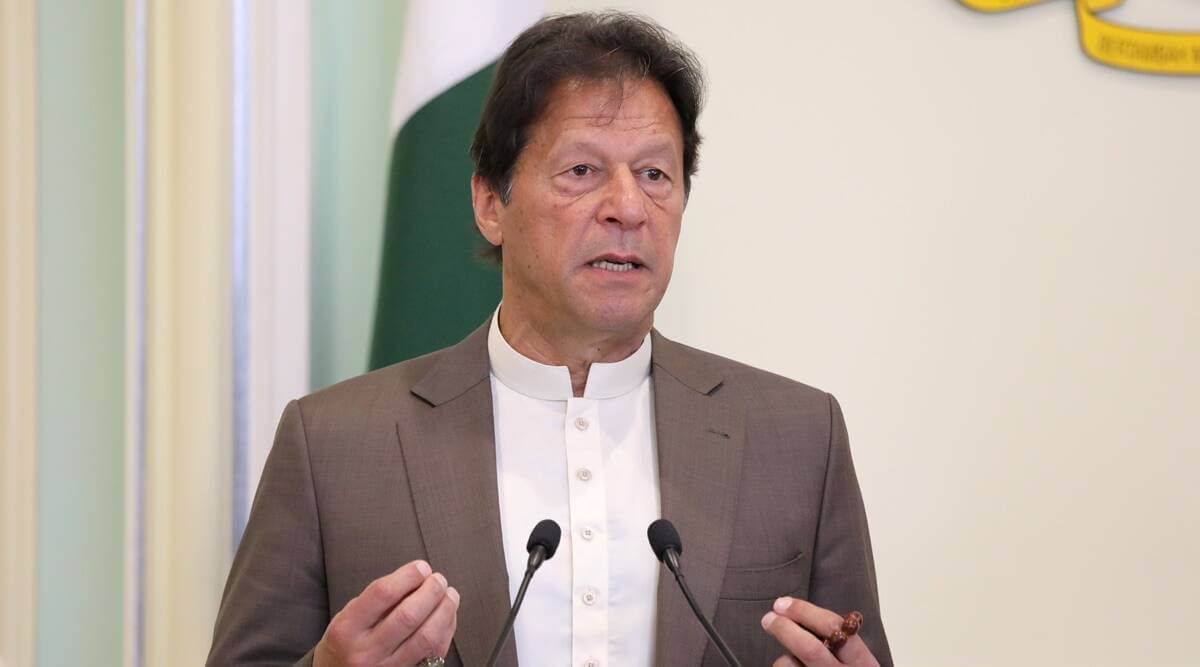During an interview with CNN, Pakistani Prime Minister (PM) Imran Khan called on India to resolve the ongoing conflict in Jammu and Kashmir (J&K) through dialogue “like good neighbours.”
Speaking about souring relations with India, Khan said that the only issue between the two neighbours is the struggle for power in Kashmir. Highlighting the need to resolve the Kashmir conflict, he warned, “If this issue keeps continuing, there is always a chance that nuclear powers could be confronting each other.”
"What concerns me the most is the chance of two nuclear powers confronting each other in the wake of Kashmir dispute"
— Prime Minister's Office, Pakistan (@PakPMO) February 13, 2022
Prime Minister @ImranKhanPTI,
exclusive interview with @CNN's GPS host @FareedZakaria pic.twitter.com/qrx0k0Zsvv
However, later in the interview, his narrative of a friendly resolution changed, with Khan directing blame towards India for its crackdown on Kashmir. He said that over 100,000 Kashmiris had died in the past 35 years as a result of the ongoing conflict. “There are extra-judicial killings. There are no rights, there are clampdowns [and] 800,000 Indian troops in the valley,” he remarked. Furthermore, Khan pointed out that the Kashmir issue has not been given “the attention it deserved.”
India and Pakistan have often blamed each other for sponsoring cross-border terrorism. India and Pakistan’s relations reached a new low following the Pulwama attack on February 26, 2019, which led to the death of over 40 CRPF members. Tensions spiked once again when India decided to rescind the special status of J&K in August 2019. Since then, both countries have engaged in a war of words and have also been vehemently looking to gather international support against the other, specifically in multilateral forums such as the Financial Action Task Force (FATF) and the Organisation of Islamic Cooperation (OIC).
During the CNN interview, Khan was asked about his opinion on the surging influence of terrorists, specifically in the Middle East. He replied that the United States’ (US) ‘war on terror,’ through its night raids and drone attacks, has contributed to breeding terrorists in the region.
Relations between Pakistan and the US have been gradually deteriorating over the past few months. During an interview in July last year, Khan criticised the US for using Pakistan as a “hired gun” in its “so-called war on terror.” He also refused to attend US President Joe Biden’s Democracy Summit in December, apparently as a show of support for China.
During his wide-ranging interview with CNN, Khan also discussed the ongoing humanitarian crisis in Afghanistan, stressing that there is no choice but to work with the Taliban. “Is there an alternative to the Taliban right now? No, there isn’t. Is there a chance that if the Taliban government is squeezed there could be a change for the better? No,” he said. The Pakistani leader opined that the international community will be able to incentivise the Taliban to improve human rights and freedoms through a “give and take” approach, and called for the recognition of the Taliban government and the unfreezing of Afghan assets.
Khan also addressed the controversial issue of China’s mistreatment of Uyghur Muslims in its Xinjiang province. He informed that he had sent an ambassador to Xinjiang who reported that the reality was different from what was portrayed by Western media organizations.
"Treatment of the Muslims should be taken even-handedly"
— Prime Minister's Office, Pakistan (@PakPMO) February 13, 2022
Prime Minister @ImranKhanPTI,
exclusive interview with @CNN's GPS host @FareedZakaria pic.twitter.com/98Q9rY854r
He then tried to deflect attention from the topic by speaking about the violation of minority rights, specifically of Muslims, in India. Touching on the hijab controversy, wherein certain educational institutions have banned students and teachers from wearing the Islamic veil, he said that the incident is a result of the surge in popularity of the Rashtriya Swayamsevak Sangh ideology, which he added is “based on hate, racial superiority and hate for Muslims, minorities, Christians, and of course Pakistan.”
Despite Khan’s attempts to sound the alarm about minority rights in India, however, the situation appears far direr in Pakistan. The country’s blasphemy law criminalises acts that disturb religious assemblies or distort religious places or objects. It also prohibits any statement that insults religious beliefs. A violation of blasphemy laws allows for a prison sentence of one to 10 years. Furthermore, according to the law, any statement or action against Prophet Muhammad attracts a death sentence or a life sentence. International rights groups have criticised the laws for being disproportionately used against minorities or critics of religious institutions in Pakistan.

